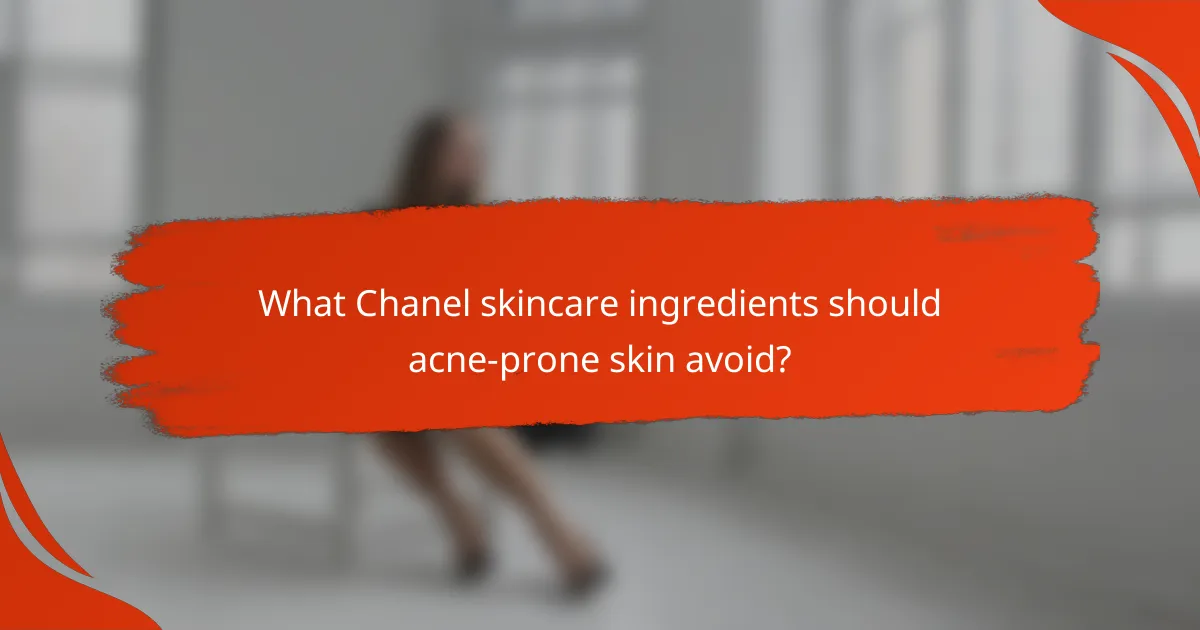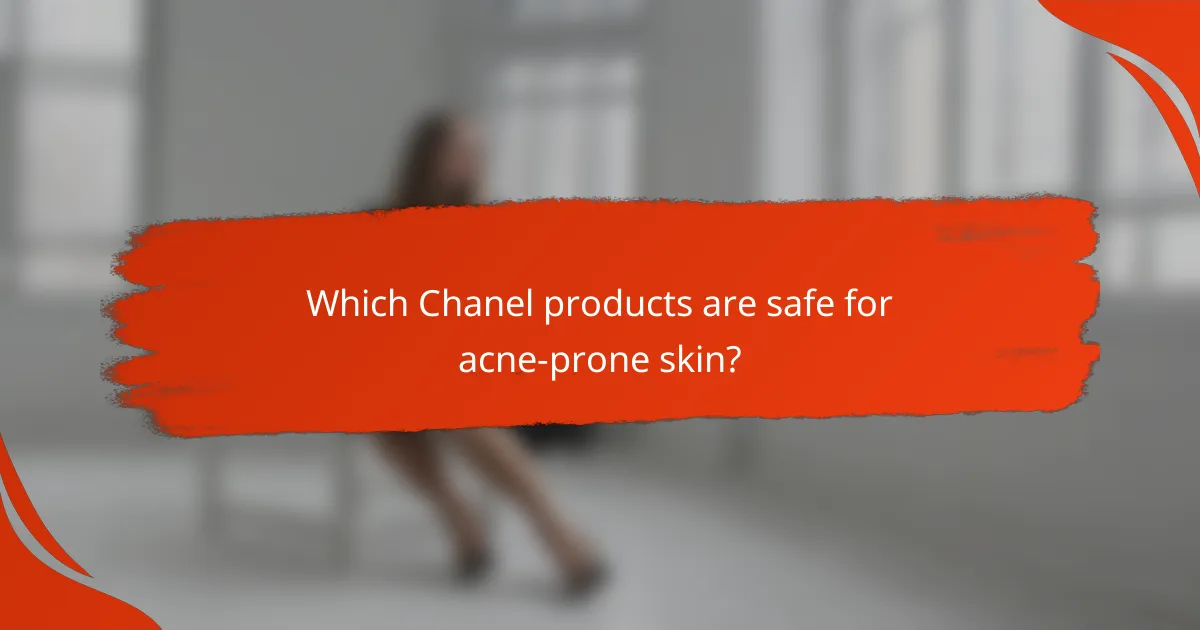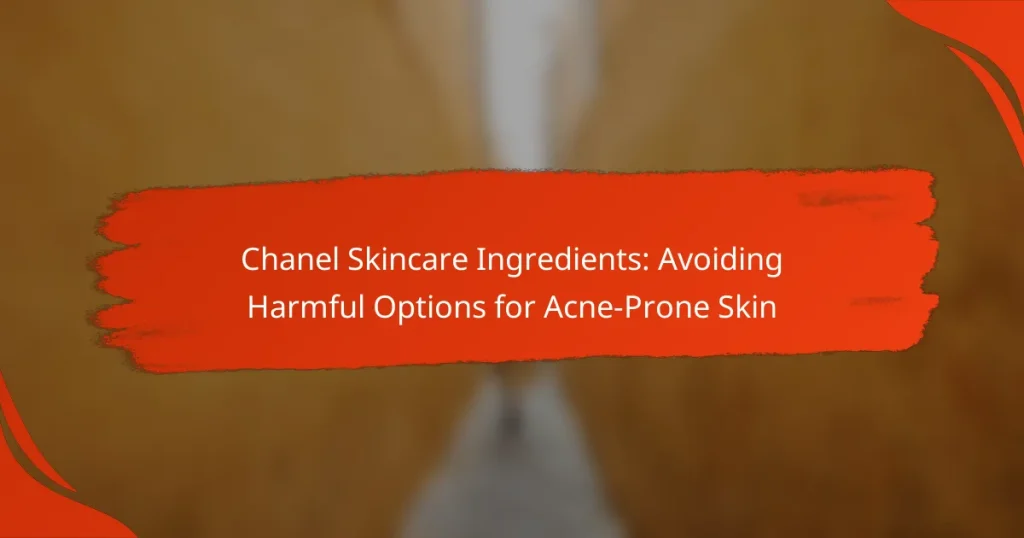When selecting Chanel skincare products for acne-prone skin, it’s crucial to avoid ingredients that can worsen breakouts or clog pores. Look out for comedogenic oils, alcohol-based components, and irritating fragrances, as these can lead to increased acne and irritation. Instead, opt for products that prioritize hydration and feature non-comedogenic ingredients to help maintain a clearer complexion.

What Chanel skincare ingredients should acne-prone skin avoid?
Acne-prone skin should avoid certain Chanel skincare ingredients that can exacerbate breakouts or clog pores. Key ingredients to watch out for include comedogenic oils, alcohol-based components, fragrance additives, heavy silicones, and parabens.
Comedogenic oils
Comedogenic oils are those that can clog pores and lead to acne flare-ups. Ingredients like coconut oil and certain mineral oils are often found in skincare products but can be problematic for those with oily or acne-prone skin.
When selecting products, look for non-comedogenic labels or opt for lighter oils such as jojoba or argan oil, which are less likely to cause breakouts.
Alcohol-based ingredients
Alcohol-based ingredients can dry out the skin, prompting it to produce more oil, which may worsen acne. Common alcohols to avoid include denatured alcohol and isopropyl alcohol, often found in toners and astringents.
Instead, choose products with hydrating ingredients that maintain moisture balance, such as glycerin or hyaluronic acid, to support acne-prone skin without the drying effects.
Fragrance additives
Fragrance additives can irritate sensitive skin and trigger allergic reactions, potentially leading to breakouts. Many Chanel products contain synthetic fragrances that may not be suitable for acne-prone individuals.
Opt for fragrance-free products or those with natural scents derived from essential oils, ensuring they are safe for your skin type.
Heavy silicones
Heavy silicones, such as dimethicone, can create a barrier on the skin that traps oil and dirt, contributing to clogged pores. While they can provide a smooth texture, they may not be ideal for those prone to acne.
Look for lighter formulations that contain water-based ingredients instead of heavy silicones to avoid potential breakouts.
Parabens
Parabens are preservatives used in many cosmetics, including some Chanel products, to prevent bacterial growth. However, they have been linked to skin irritation and hormonal disruptions, which could aggravate acne-prone skin.
Choose paraben-free products to minimize the risk of irritation and to support healthier skin without the potential side effects associated with these preservatives.

Which Chanel products are safe for acne-prone skin?
Chanel offers several products that are suitable for acne-prone skin, focusing on hydration and non-comedogenic ingredients. The key is to choose products that avoid heavy oils and irritants, promoting a clearer complexion without exacerbating breakouts.
Chanel Hydra Beauty Gel Cream
The Chanel Hydra Beauty Gel Cream is designed to provide lightweight hydration, making it a good option for those with acne-prone skin. Its gel-based formula absorbs quickly and contains ingredients like camellia flower extract, which helps to soothe and hydrate without clogging pores.
When using this product, apply a small amount to clean skin, focusing on areas that feel dry. Avoid layering it with heavy creams to maintain its lightweight benefits.
Chanel Blue Serum
Chanel Blue Serum is formulated with natural ingredients that aim to enhance skin vitality. It includes green coffee extract, which is known for its antioxidant properties, helping to protect the skin from environmental stressors that can trigger breakouts.
For best results, apply the Blue Serum after cleansing and before moisturizing. This helps to lock in hydration and provides a protective barrier, making it suitable for daily use on acne-prone skin.
Chanel Ultra Correction Lift Serum
The Chanel Ultra Correction Lift Serum targets signs of aging while being gentle on acne-prone skin. Its lightweight formula includes hyaluronic acid, which hydrates without adding excess oil, making it a versatile choice for those concerned about both acne and aging.
Use this serum in the morning and evening for optimal results. A small amount is sufficient to cover the face and neck, ensuring you don’t overwhelm your skin with product.

How to identify harmful ingredients in skincare?
Identifying harmful ingredients in skincare involves understanding what to look for on product labels and utilizing available tools. Key indicators include certain preservatives, fragrances, and alcohols that can irritate acne-prone skin.
Understanding ingredient labels
Ingredient labels list components in descending order by weight, meaning the first few ingredients are the most significant. Look for terms like “parabens,” “sulfates,” and “fragrance,” which are often linked to skin irritation and breakouts.
Familiarize yourself with common irritants and allergens. For instance, alcohol denat can dry out the skin, while certain oils may clog pores. A good rule of thumb is to avoid products where these ingredients appear in the top half of the list.
Using ingredient-checking apps
Ingredient-checking apps can simplify the process of evaluating skincare products. These apps allow you to scan barcodes or search for products to quickly identify harmful ingredients based on user reviews and expert analysis.
Popular apps include Think Dirty and INCI Decoder, which provide detailed breakdowns of ingredients and their potential effects on skin health. Using these tools can help you make informed choices and avoid products that may exacerbate acne.

What are the benefits of using non-comedogenic products?
Non-comedogenic products are formulated to avoid clogging pores, making them ideal for acne-prone skin. Using these products can help reduce the frequency and severity of breakouts while promoting overall skin health.
Reduced breakouts
One of the primary benefits of non-comedogenic products is their ability to minimize breakouts. These formulations contain ingredients that do not block pores, which is crucial for those with acne-prone skin. By choosing products labeled as non-comedogenic, you can significantly lower the risk of developing new blemishes.
When shopping for skincare, look for ingredients like glycerin, hyaluronic acid, and certain plant oils, which are less likely to cause breakouts. Avoid heavy oils and waxes that can lead to clogged pores.
Improved skin texture
Non-comedogenic products can also enhance skin texture over time. By preventing clogged pores, these products help maintain a smoother, clearer complexion. This can lead to a more even skin tone and a reduction in the appearance of acne scars.
Incorporating non-comedogenic moisturizers and serums can help keep your skin hydrated without the risk of breakouts. Look for lightweight formulations that absorb quickly and provide essential nutrients without adding excess oil.

How does Chanel ensure ingredient safety?
Chanel prioritizes ingredient safety by adhering to rigorous testing and sourcing standards. The brand employs comprehensive clinical testing protocols and emphasizes transparency in ingredient sourcing to minimize risks for consumers, particularly those with acne-prone skin.
Clinical testing protocols
Chanel implements extensive clinical testing protocols to evaluate the safety and efficacy of its skincare products. These protocols often include dermatological assessments, patch tests, and consumer trials to ensure that products do not irritate or exacerbate acne-prone skin.
Additionally, Chanel follows international safety regulations, such as those set by the European Union, which mandates thorough testing for cosmetic ingredients. This commitment helps to identify potentially harmful substances before they reach the market.
Ingredient sourcing transparency
Chanel emphasizes ingredient sourcing transparency by providing detailed information about the origins and quality of its components. This approach allows consumers to make informed choices, especially those concerned about specific allergens or irritants in their skincare.
The brand collaborates with suppliers who adhere to strict sustainability and ethical standards, ensuring that ingredients are not only safe but also responsibly sourced. By maintaining this level of transparency, Chanel helps to build trust with consumers who prioritize ingredient safety in their skincare routines.

What emerging trends in skincare should acne-prone individuals watch?
Acne-prone individuals should pay attention to trends that emphasize gentle, effective ingredients and formulations. These trends often focus on minimizing irritation while maximizing skin health, which is crucial for managing acne.
Clean beauty movement
The clean beauty movement prioritizes products made without harmful chemicals, synthetic fragrances, and other potentially irritating ingredients. For those with acne-prone skin, this trend is particularly beneficial as it encourages the use of non-comedogenic and gentle formulations.
When selecting clean beauty products, look for labels that highlight transparency in ingredient sourcing and formulation. Ingredients like plant extracts, essential oils, and natural preservatives can often provide effective results without the harshness of traditional products.
However, not all “clean” products are suitable for everyone. Always check for potential allergens and do a patch test before fully incorporating a new product into your routine. Avoid products with heavy oils or alcohols that may exacerbate acne.

